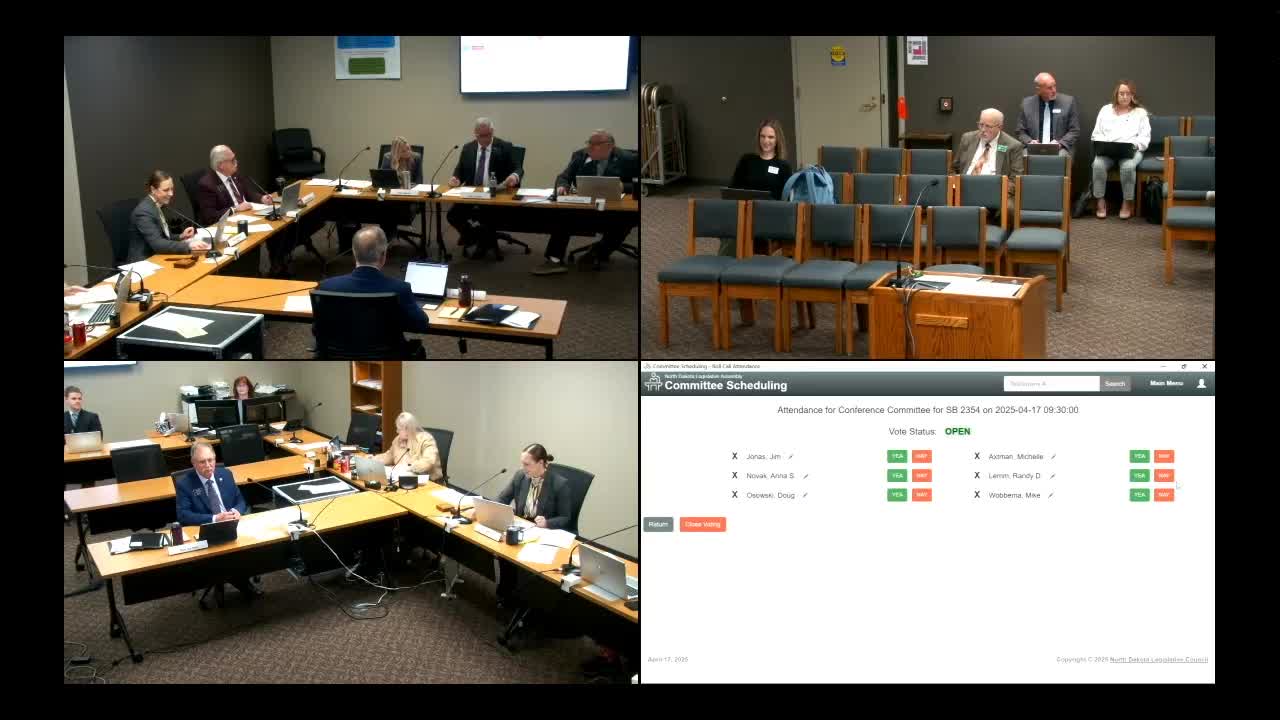Senate committee approves amendment to student device bill, adds nonpublic schools and narrows data mandate
Get AI-powered insights, summaries, and transcripts
Subscribe
Summary
A Senate committee approved an amendment to Senate Bill 2354 that incorporates several House changes to statewide rules on student personal electronic devices, including explicitly covering nonpublic schools, replacing "locked" with "stowed," reorganizing requirements, and narrowing required data collection.
At a Senate committee meeting, members approved an amendment to Senate Bill 2354 that incorporates several changes the House made to a bill on student personal electronic devices and district policies.
Chair Axman opened the meeting by explaining why members had copies of House Bill 1160 and Senate Bill 2354 and how the versions will interact if both become law. She said the bill that is signed last will supersede conflicting language, making today’s decisions important for the final statutory text.
The amendment the committee approved makes several substantive edits the House added. Representative Jonas said the House added nonpublic schools “because we feel it was important too that they be included. You have your private Catholic schools. You have your your classical education schools now.” The amendment therefore extends the bill’s coverage beyond public districts to include schools that do not receive public-operating control in the same way as public districts.
The committee also accepted language changes clarifying where device rules apply. Earlier versions used the phrase “instructor and instructional time”; the revised language refers to schools that provide prekindergarten, elementary and secondary education so that off-site activities (for example, career-technical courses or job learning experiences) are not automatically excluded.
The House substituted the word “stowed” for “locked” when describing how personal electronic devices should be secured during restricted times. Representative Jonas said the change aimed to give districts flexibility because schools use different methods — pouches, lockers or other storage — and some districts no longer have lockable student lockers.
The committee discussed and removed an enumerated subsection that had listed specific storage options (for example, “lockable pouch, phone locker, pencil pouch, mail envelope”). Members said they would reinsert that subsection and then strike it in the amendment language so the record would show intent to remove it while ensuring legislative counsel understood the committee’s direction.
The bill’s data-collection requirement was narrowed. The earlier language asked districts to “determine the impact” of device policies and listed metrics including student behavior, disciplinary incidents, attendance, academic performance and mental health. The committee voted to change the phrasing to require school districts to “collect data annually with the goal of measuring the impact of its policy on student behavior, disciplinary incidents, school attendance and academic performance,” and to remove the explicit reference to mental health and the prescriptive deadline language. Representative Novak asked how “student behavior” would differ from “disciplinary incidents,” saying, “what exactly is the difference between student behavior and disciplinary incidents, and how would we measure those differently?” Amy Cook, identified in the record as from the Scribe Birds Association, said “student behavior is a much broader term and could encompass something different than disciplinary incidents.”
The House also added a new subsection requiring districts to provide information to students, parents and caregivers — for example, on district websites and in student handbooks — so families understand the policy and the reasons the district is adopting it. Representative Jonas said that requirement reflected the view that improved communication would help explain the policy locally and answer parent questions.
After discussion, the committee chair proposed approving the amendment and preparing an official copy for a follow-up meeting. A motion to adopt the committee amendment as discussed was moved and carried on a recorded voice/roll call. Those recorded as voting yes included Chair Axman; Senator Wapoma; Senator Lamb; Representative Jonas; Representative Novak; and Representative Roselski. The transcript records no no votes or abstentions for that motion. The committee agreed to reconvene to consider the final amended text of Senate Bill 2354 and to review the outcome of House Bill 1160, because whichever bill is signed last would control in the event of conflicting language.
Discussion only took place on the changes that the House made plus some clarifying edits proposed by the committee; the committee did not adopt final statutory text at that meeting and left the bill pending a future meeting.
The amendment approved at the meeting would, if enacted as the last-signed version, supersede conflicting provisions in House Bill 1160.
